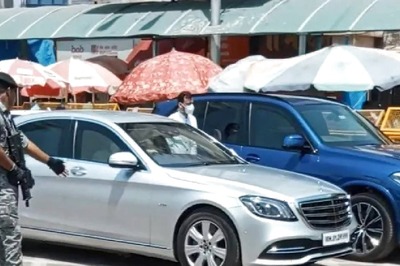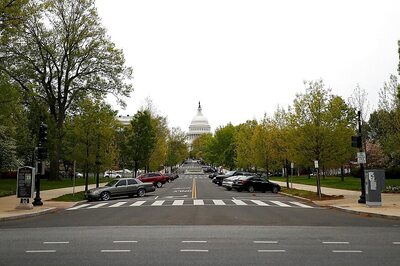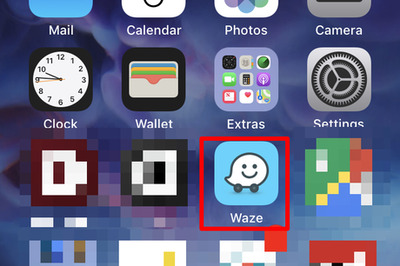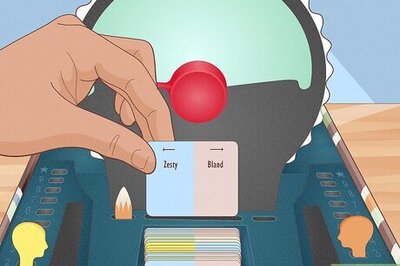
views
My colleagues- Prabal Pratap Singh from Channel 7 and cameraman Surendra Mandral and I did both- and felt quite prepared.
But nothing really prepared us for the destruction in Dahyeh. In the south of Lebanon Israeli forces are engaged in pitched battles with the Hezbollah- but there's been no resistance in Dahyeh- as wave upon wave of aerial bombardment has hit this area just 20 minutes from Beirut proper.
This suburb- sort of like Gurgaon or Vashi, right at the south of the capital of Lebanon- is completely controlled by the Hezbollah. It didn't surprise me that our car driver George didn't want to go- it was only after we convinced him that someone from the dreaded group would meet us that he even agreed- driving extra slowly in the hope that we would change our mind.
The scenery changed gradually- from the posh buildings of the newly reconstructed Beirut city centre to the more modest homes, from the smooth as silk expressways to the the roads in need of repair- and then bam- right there- to a flyover completely demolished in front of us. That said, George, had been taken out in the first few days of Israeli airstrikes.
The Hezbollah fighter who met us- could have quite easily been a bank executive- well-spoken and dressed. Amongst the journalists- we call him the "Presbollah". But this is a radical Islamist group- and as soon I put my hand out to shake his- he shrank back- and said "excuse me I don't shake hands with women." (OK I knew that was pretty stupid of me.)
For the next hour he took us, and other journalists on a walking tour (closer to a breathless-running tour) of all that the Israelis had bombed in two weeks. We saw apartment buildings reduced to rubble, roads shattered, personal belongings strewn everywhere. As I crunched shards of glass under my shoes- I realized the use of the second piece of advice I had been given. The first piece of advice, of course, saved us from Hezbollah sniper fire.
The Israeli Defence Forces may be trying to pinpoint targets here- but it seems they pretty much got everything in Dahyeh. I kept seeing people darting into mounds of dust that must once have been their homes, pulling some belonging out and putting it in their car. Many were simply salvaging mattresses. All the while looking up at the sky- as if they expected something else to fall out of it and kill them this time.
And when the Israeli helicopters circling above us were greeted by a machine gun rattle from somewhere close to us- it was time for all of us- journalists, photographers- and the people on the mounds to race for cover- and out of Dahyeh.
In all, this, I should add the IDF has had some "successful" hits in Dahyeh- the Hezbollah press and communication centre, the Hezbollah run television channel Al-Manara's broadcast station, several offices of the guerilla group, and even a conference hall where group leader Sheikh Hassan Nasrallah would hold public meetings.
But with each success- has come the brutal cost. Homes destroyed, children killed- you have probably seen the worst on television already from across Lebanon- and I don't need to describe it- and we saw some of it that day in Dahyeh.
There is no question that it is wrong of the Hezbollah to operate from urban pockets- where the collateral damage of a strike is very high. There is no question that Israel has suffered civilian casualties too - but the question that is never answered remains- can a state really adopt the tactics of terror groups?
Somewhere there- not just us - but the Lebanese people have become immune to what is happening in this country. When sirens went out yesterday, followed by a dozen big strikes on Dahyeh- I saw people in Beirut just keep walking, doing what they were doing without pausing more than a second when the next big boom rattled the city.
As for the international community- and the US in particular- the response has been pretty much the same as the response to a natural disaster- mark Israeli airstrikes on Lebanon along with the typhoons in China, the earthquake in Iran, or even Hurricane Katrina in the US. Lets get the food cooked, let's send medicine convoys, lets pitch tents and prepare for the refugees. But halt the bombing- or effect a ceasefire? That it seems- is just as ridiculous as stopping a tsunami.
Lets hope the Rome roundtable produces more than a roster for humanitarian aid. Not just for the sake people of Dahyeh and Southern Lebanon- but for those in Haifa and Netanya too.About the AuthorSuhasini Haidar Suhasini Haidar is Diplomatic Editor, The Hindu. Earlier, she was a senior editor and prime time anchor for India's leading 24-hour English news chann...Read Morefirst published:July 27, 2006, 18:02 ISTlast updated:July 27, 2006, 18:02 IST
window._taboola = window._taboola || [];_taboola.push({mode: 'thumbnails-mid-article',container: 'taboola-mid-article-thumbnails',placement: 'Mid Article Thumbnails',target_type: 'mix'});
let eventFire = false;
window.addEventListener('scroll', () => {
if (window.taboolaInt && !eventFire) {
setTimeout(() => {
ga('send', 'event', 'Mid Article Thumbnails', 'PV');
ga('set', 'dimension22', "Taboola Yes");
}, 4000);
eventFire = true;
}
});
window._taboola = window._taboola || [];_taboola.push({mode: 'thumbnails-a', container: 'taboola-below-article-thumbnails', placement: 'Below Article Thumbnails', target_type: 'mix' });Latest News
The security expert I spoke to before heading out to the South Beirut area called Dahyeh had two bits of advice. Don't go there without contacting a senior Hezbollah leader. And wear sturdy shoes.
My colleagues- Prabal Pratap Singh from Channel 7 and cameraman Surendra Mandral and I did both- and felt quite prepared.
But nothing really prepared us for the destruction in Dahyeh. In the south of Lebanon Israeli forces are engaged in pitched battles with the Hezbollah- but there's been no resistance in Dahyeh- as wave upon wave of aerial bombardment has hit this area just 20 minutes from Beirut proper.
This suburb- sort of like Gurgaon or Vashi, right at the south of the capital of Lebanon- is completely controlled by the Hezbollah. It didn't surprise me that our car driver George didn't want to go- it was only after we convinced him that someone from the dreaded group would meet us that he even agreed- driving extra slowly in the hope that we would change our mind.
The scenery changed gradually- from the posh buildings of the newly reconstructed Beirut city centre to the more modest homes, from the smooth as silk expressways to the the roads in need of repair- and then bam- right there- to a flyover completely demolished in front of us. That said, George, had been taken out in the first few days of Israeli airstrikes.
The Hezbollah fighter who met us- could have quite easily been a bank executive- well-spoken and dressed. Amongst the journalists- we call him the "Presbollah". But this is a radical Islamist group- and as soon I put my hand out to shake his- he shrank back- and said "excuse me I don't shake hands with women." (OK I knew that was pretty stupid of me.)
For the next hour he took us, and other journalists on a walking tour (closer to a breathless-running tour) of all that the Israelis had bombed in two weeks. We saw apartment buildings reduced to rubble, roads shattered, personal belongings strewn everywhere. As I crunched shards of glass under my shoes- I realized the use of the second piece of advice I had been given. The first piece of advice, of course, saved us from Hezbollah sniper fire.
The Israeli Defence Forces may be trying to pinpoint targets here- but it seems they pretty much got everything in Dahyeh. I kept seeing people darting into mounds of dust that must once have been their homes, pulling some belonging out and putting it in their car. Many were simply salvaging mattresses. All the while looking up at the sky- as if they expected something else to fall out of it and kill them this time.
And when the Israeli helicopters circling above us were greeted by a machine gun rattle from somewhere close to us- it was time for all of us- journalists, photographers- and the people on the mounds to race for cover- and out of Dahyeh.
In all, this, I should add the IDF has had some "successful" hits in Dahyeh- the Hezbollah press and communication centre, the Hezbollah run television channel Al-Manara's broadcast station, several offices of the guerilla group, and even a conference hall where group leader Sheikh Hassan Nasrallah would hold public meetings.
But with each success- has come the brutal cost. Homes destroyed, children killed- you have probably seen the worst on television already from across Lebanon- and I don't need to describe it- and we saw some of it that day in Dahyeh.
There is no question that it is wrong of the Hezbollah to operate from urban pockets- where the collateral damage of a strike is very high. There is no question that Israel has suffered civilian casualties too - but the question that is never answered remains- can a state really adopt the tactics of terror groups?
Somewhere there- not just us - but the Lebanese people have become immune to what is happening in this country. When sirens went out yesterday, followed by a dozen big strikes on Dahyeh- I saw people in Beirut just keep walking, doing what they were doing without pausing more than a second when the next big boom rattled the city.
As for the international community- and the US in particular- the response has been pretty much the same as the response to a natural disaster- mark Israeli airstrikes on Lebanon along with the typhoons in China, the earthquake in Iran, or even Hurricane Katrina in the US. Lets get the food cooked, let's send medicine convoys, lets pitch tents and prepare for the refugees. But halt the bombing- or effect a ceasefire? That it seems- is just as ridiculous as stopping a tsunami.
Lets hope the Rome roundtable produces more than a roster for humanitarian aid. Not just for the sake people of Dahyeh and Southern Lebanon- but for those in Haifa and Netanya too.




















Comments
0 comment